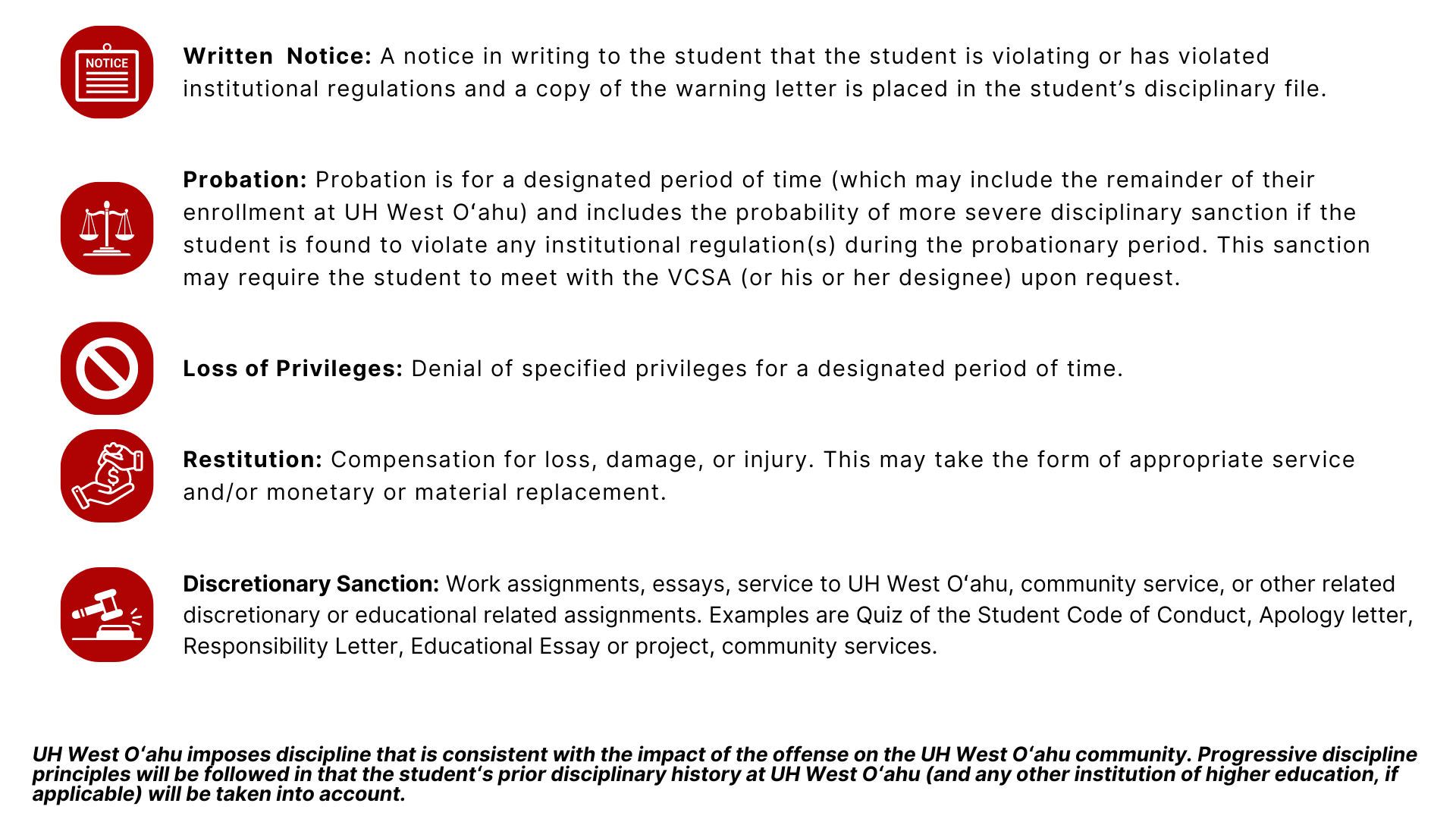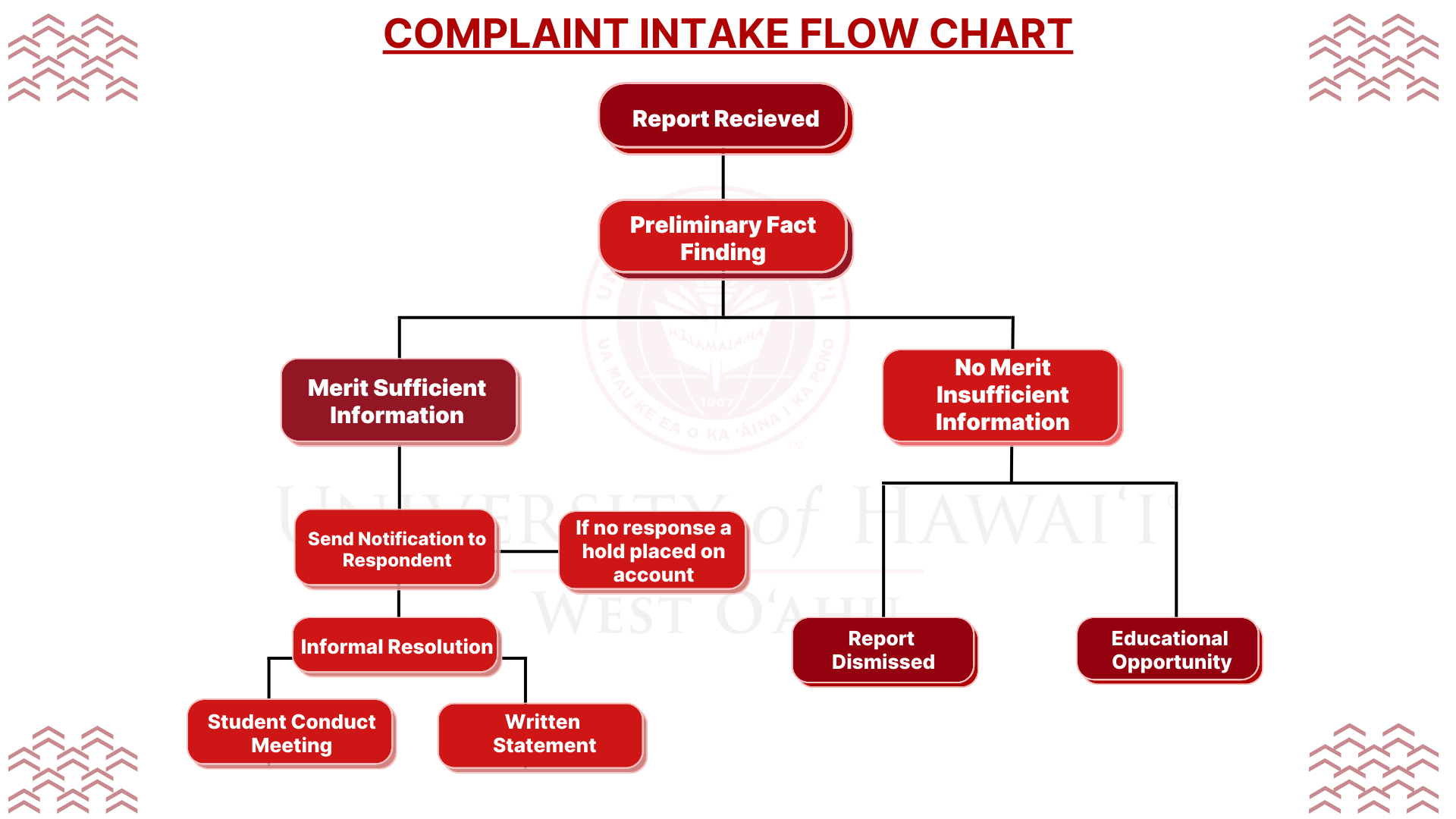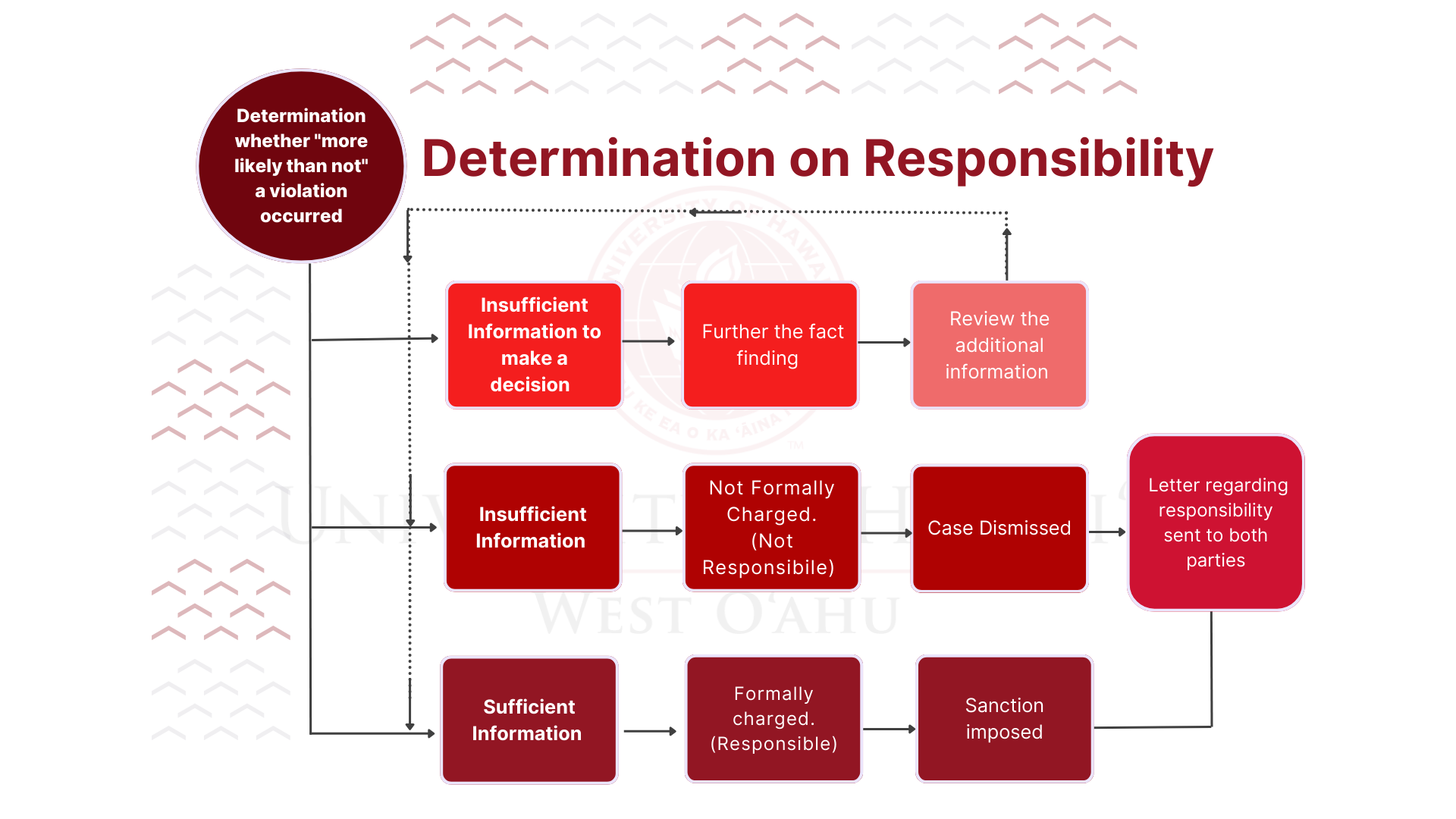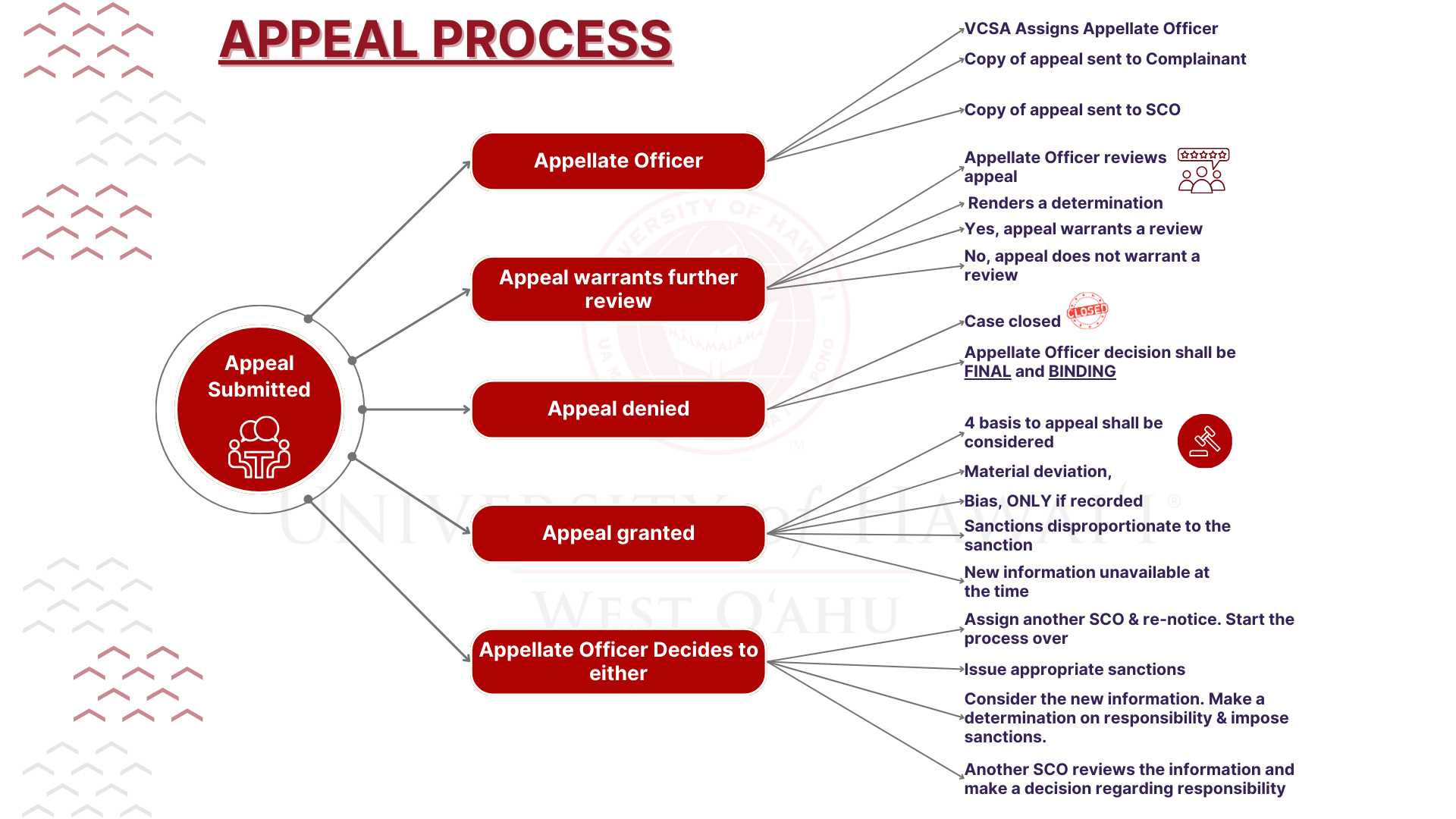Article IV
Student Conduct Process (Due Process)
- Anyone may file a report against a student for (an) alleged violation(s) of the Student Code of Conduct. All students accused of violating this Student Code of Conduct are entitled to due process, which includes written notification of the alleged violation and a reasonable opportunity to respond and provide evidence and/or witnesses to be considered prior to any final decision.
- An allegation of a Student Code of Conduct violation must be directed to the SCO using the online report form. Any report of a violation of the Student Code of Conduct should be submitted as soon as possible after the event takes place. However, all reports will be reviewed in accordance with this process, regardless of when the report is filed.
- The SCO will be responsible for training and assigning Student Code of Conduct cases to appropriate Student Conduct Officers when necessary.
- The SCO will conduct an impartial and reliable preliminary fact-finding investigation of all allegations to determine if the allegation(s) have merit and/or if they can be resolved administratively. Such disposition shall be final and there shall be no subsequent proceedings.
- If it is determined that the allegation(s) has/have no merit, the report will be considered closed and dismissed. The SCO may request a non mandatory meeting with the Respondent to discuss the information stated in the report. The meeting will be scheduled at the discretion of the SCO.
- If it is determined that the allegation(s) has/have merit, the Respondent will receive an official notification via email that (an) alleged violation(s) has/have been reported. All official correspondence regarding the Student Code of Conduct process will be communicated to the Respondent through their official UH West Oʻahu email account.
- In the official written notification, the Respondent shall be provided the following:
- a. How the alleged violation(s) came to the attention of UH West O`ahu;
- b. A detailed written summary of the allegation(s) so that the Respondent may properly prepare for his or her meeting or response to the allegation(s);
- c. The Respondent will be directed to either schedule an appointment with the SCO or submit a written statement.
- d. A reasonable opportunity to provide his or her statement for consideration, as well as the names of any relevant witness(es) for consideration by the SCO.
- If the Respondent schedules an appointment, the SCO reviews the facts concerning the alleged violation(s) in order to determine if the Respondent will be formally charged with (a) violation(s) of the Student Code of Conduct;
- The SCO meeting will be scheduled at the convenience of the SCO, however, all efforts will be made to schedule the meeting as soon as possible (considering the student’s on-campus schedule).
- If the Respondent is unable to, or does not wish to meet with the SCO in person, the Respondent may submit a statement in writing for consideration (via their UH West Oʻahu email account or in person) responding to the allegation(s) and must provide a picture ID to confirm the proper identity of the Respondent (if unknown by the SCO) within the required response period.
Other arrangements may be made to facilitate the meeting, such as video or phone conference, when a face to face meeting may be difficult for the Respondent and at the sole discretion of the SCO. In situations where a meeting other than a face to face meeting will be held, the student must provide a copy of their identification to the SCO before the meeting can occur. A face to face meeting is always the preferred option.
If the Respondent fails to provide a copy of their identification prior to the start of the meeting, the meeting may be rescheduled at the discretion of the SCO. - In the event that the Respondent fails to contact the SCO, fails to schedule an appointment, or fails to submit a written statement within five (5) working days of the date listed on the written notification (excluding Saturday, Sunday, and Holidays), a hold will be placed on the Respondent’s record until the Respondent responds to the notification, which may result in the Respondent’s inability to register.
- If, after receiving notice, a Respondent elects not to appear or provide a written statement (in Lieu of an appearance) to a SCO prior to a meeting, the SCO shall render a determination using information that has been provided. In addition, the Respondent shall be considered to have “waived” his or her right to appeal, and the decision of the SCO will be considered final.
- If either party requests an alternate form of resolution and the other party agrees, the parties will engage in an informal resolution to informally resolve the issue. If the informal resolution results in a mutual satisfaction of both parties, then the case will be considered resolved. If the case is not resolved, then the case may be moved to a formal resolution by the SCO.
Informal resolution is available for cases involving both Sex and Gender Based Misconduct [Article III(B)(4)(a-i)] and Discrimination [Article III(B)(5)] only if a formal complaint has been filed and both parties agree to informally resolve the complaint. (University of Hawai’i Administrative Complaint Procedures Title IX Sexual Harassment Grievance Process AP 1.204, III.F.1-7 (Dated 1/22)) (University of Hawai’i Discrimination Complaint Procedure for Students, Employees, and Applicants for Admission or Employment AP 1.202, III.C.3.a-f (Dated 2/1/2023)).
- During the scheduled meeting, the Respondent will meet one on one with the SCO and must provide a picture ID to confirm the proper identity of the Respondent (if unknown by the SCO). Representatives, parents or authorized campus personnel will only be allowed in this meeting at the discretion of the SCO when deemed appropriate. In addition, a FERPA release must be signed by the Respondent.
- There shall be a single verbatim record of all SCO meetings. The digital recording (Per HRS 803-42(b)(4), HI allows a recording of a communication as long as one of the parties in the meeting consents to the recording) shall be the property of UH West O’ahu. For the purposes of FERPA, the recording is considered an educational record and cannot be reviewed unless a release is signed by all students with identifiable information contained in the recording. A student involved in the recording may request an opportunity to review the recording (in the presence of an authorized employee) only if the meeting involved one student without discussion of any witnesses (on the recording), and the student on the recording is the individual requesting the review.
- SCO meetings shall be conducted using the following guidelines below except as provided by Article IV(A)(25):
- a. All SCO meetings shall be conducted in private. In cases involving Sex and Gender Based Misconduct and any discrimination, UH West O’ahu recognizes the importance of confidentiality and will make every effort to preserve the privacy of all parties to the extent possible or as required by law. [Please refer to the University of Hawaii Executive Policy EP 1.204 and EP 1.202]. However, for safety reasons, the SCO may request the presence of Campus Security during any student conduct meetings.
- b. In cases involving more than one Respondent, the SCO will conduct the meetings separately to determine the responsibility of each student.
- c. Formal rules of procedure, and/or technical rules of evidence, such as those that are applied in criminal or civil court, are not used (and do not apply) in this Student Code of Conduct process.
- d. The tone of the meeting will be educational and not adversarial.
- e. If a disruption occurs during the meeting, the SCO, in his or her sole discretion, may have the disruptive party removed from the meeting, and the SCO shall be authorized to make a determination on the information already provided. If the individual causing the disruption is a student, he or she may be charged with a violation of the Student Code of Conduct, specifically, Article III(B)(19)(b): “Abuse of the Student Code of Conduct process, including but not limited to: b. Disruption or interference with the orderly conduct of an SCO meeting.”
- f. The parties may provide the SCO with a list of potential witnesses and a summary of information and/or copies of documents or relevant information they believe will assist the SCO in understanding their version of events. Pertinent information received from witnesses and the parties, records, exhibits, and written statements may be accepted as information for consideration by a SCO at the sole discretion of the SCO.
- g. The SCO in his or her sole discretion will determine which information is relevant given the report and or the facts and circumstances.
- h. During the meeting, the SCO shall determine whether the Respondent has violated each section of the Student Code of Conduct which the Respondent is alleged to have violated. However, the SCO may also consider a different charge if he or she believes the facts support (a) charge(s) different from the charge(s) with which the Respondent was originally charged. If the charge(s) is/are different from the charge(s) listed in the original notification, then the SCO will discuss or notice the Respondent so that he/she may respond appropriately to the new charge(s).
- i. Requests for a continuance shall be at the discretion of the SCO.
- j. The SCO’s determination shall be made on the basis of whether “more likely than not” (“preponderance of the evidence” standard of proof) the Respondent violated the Student Code of Conduct.
- After reviewing the available facts with the Respondent, and/or after reviewing the Respondent’s statement, a decision will be made whether to formally charge the Respondent with (a) violation(s) of the Student Code of Conduct, administratively resolve the case (case closed), or further the fact-finding based on information provided by the Respondent.
- Based on all the facts and circumstances presented, the charge(s) may be amended or changed, and the Respondent will be made aware of the change(s) immediately or as soon as possible verbally or in writing.
- If the decision is made to further the fact-finding process, the Respondent will be notified and/or asked for follow-up information when necessary via email once the fact-finding is completed.
- If the decision is made not to formally charge the Respondent, the Respondent shall be notified verbally during the meeting with a follow-up letter or shall be sent a letter after the meeting via email as soon as possible.
- If the SCO has decided as to whether “more likely than not” the Respondent has not violated any provision of the Student Code of Conduct, the Respondent will not be formally charged. The case is administratively dismissed and considered closed.
- If the decision is made to formally charge the Respondent, the Respondent shall be notified verbally during the meeting with a follow-up letter or shall be sent a letter after the meeting via the student’s UH West O’ahu email as soon as possible.
- If the SCO has made a decision as to whether “more likely than not” the Respondent has violated at least one provision of the Student Code of Conduct, the SCO will consider and assign (an) appropriate sanction(s).
- UH West Oʻahu uses progressive discipline as a means for preserving its educational and working environment. Once a Respondent has been found responsible for violating the Student Code of Conduct, the SCO will use all information available, including but not limited to: prior violations of the Student Code of Conduct (if any), community service involvement, and/or employment to determine (an) appropriate sanction(s).
- The SCO may accommodate concerns for the personal safety, well-being, and/or fears of confrontation of the SCO, Complainant, Respondent, and/or other witnesses while the case is being resolved. These concerns may be addressed in a variety of ways including, but not limited to, UH West O’ahu Mutual No–contact Orders, campus security presence at meetings, removal from class, campus, or area for a short period or reasonable schedule adjustments. Removal for a period longer than a day requires an Interim Suspension [see Article IV(C)].
- All Complainants will receive information regarding the notification of the alleged violations sent to the Respondents, as well as the outcome and final decision of the case. In cases involving sex and gender based misconduct (offenses listed under Article III(B)(4)(a-j)), the Complainants and the Respondent will receive the same notification of allegation(s) as well as, the determination of responsibility and sanctions (or as required under the Executive Policy on Sex and Gender Based Misconduct Policy EP 1.204).
- Both parties will be given information regarding the status of the case when it has been resolved by an SCO via email. Information regarding the appeal process shall be made available to both parties.
1. In cases where a student has been found “more likely than not” to have engaged in prohibited conduct (as listed under Article III(B)(1-3) & (6-20) above), UH West Oʻahu will impose discipline that is consistent with the impact of the offense on the UH West Oʻahu community. Progressive discipline principles will be followed in that the student’s prior disciplinary history at UH West Oʻahu (and any other institution of higher education, if applicable) will be taken into account, along with any other relevant information while determining sanctions. Disciplinary action taken against a student may include, but is not limited to, one or more of the following:
a. Written Warning: A notice in writing to the student that the student is violating or has violated institutional regulations and a copy of the warning letter is placed in the student’s disciplinary file.
b. Probation: Probation is for a designated period of time (which may include the remainder of their enrollment at UH West Oʻahu) and includes the probability of more severe disciplinary sanctions if the student is found to violate any institutional regulation(s) during the probationary period. This sanction may require the student to meet with the VCSA (or his or her designee) upon request.
c. Loss of Privileges: Denial of specified privileges for a designated period of time.
d. Restitution: Compensation for loss, damage, and/or injury. This may take the form of appropriate service and/or monetary or material replacement.
e. Discretionary Sanctions: Work assignments, essays, service to UH West Oʻahu, Community Service or other related discretionary or educational related assignments.
f. UH West Oʻahu Mutual No Contact Orders: No unnecessary contact between the Respondent and the Complainant, witnesses, or other individuals (when appropriate).
g. Suspension: Separation of the student from UH West Oʻahu for a definite period of time (usually 1 year or less) after which the student is eligible to return. Conditions for readmission may be specified. Suspensions may be effective immediately or deferred.
h. Dismissal: Separation of the student from UH West Oʻahu for more than 1 year. The student may be eligible for return. Conditions for readmission, if any, will be specified. Dismissals will be effective immediately unless otherwise stated.
i. Expulsion: Separation of the student from UH West Oʻahu permanently. Expulsions will be effective immediately, unless otherwise stated.
j. Revocation of Admission and/or Degree: Admission to or a degree awarded from UH West Oʻahu may be revoked for fraud, misrepresentation, or other violation of UH West Oʻahu standards in obtaining the degree, or for other serious violations committed by a student prior to graduation.
2. Recommend system-wide sanctions.
3. Withholding Degree or Certificate — UH West Oʻahu may withhold awarding a degree otherwise earned until the completion of the process set forth in this Student Code of Conduct, including the completion of all sanctions imposed, if any.
4. More than one of the sanctions listed above may be imposed for any single violation.
5. The following sanctions may be imposed upon recognized UH West Oʻahu student groups or organizations:
a. Those sanctions listed above in Article IV(B)(1)(a-j). Those sanctions listed above in Article IV(B)(1)(a-j).
b. Those sanctions listed above in Article IV(B)(1)(a-j).
c. Deactivation. (Loss of all privileges may be issued, including UH West Oʻahu recognition, for a specified period of time.)
6. Once the SCO has determined that a student and/or group or organization has violated the Student Code of Conduct, the SCO shall make a final determination of the sanctions to be imposed, taking into consideration all information presented at the meeting and other information available to the SCO, if applicable.
7. The SCO shall advise the Respondent, group and/or organization in writing via email of the decision and of the sanction(s) imposed, if any.
In certain circumstances, the VCSA or SCO, may impose an interim suspension prior to a SCO meeting.
- Interim suspension may only be imposed in the following circumstances:
- a. To ensure the safety and well-being of members of the UH West Oʻahu community or preservation of UH West Oʻahu property;
- b. To ensure the student’s own physical or emotional safety and well-being; or
- c. If the student poses an ongoing threat of disruption of, or interference with, the normal operations of UH West Oʻahu.
- Interim suspension will take effect immediately upon the direction of the VCSA or SCO and last for no more than ten (10) working days (Saturdays, Sundays, and Holidays are not included). The 10-day period may be extended for good cause by the SCO or by agreement with the Respondent.
- During the interim suspension, the Respondent shall be denied access to the campus (including face-to-face and online classes when appropriate) and/or all other UH West Oʻahu activities or privileges for which the student might otherwise be eligible, as the SCO may determine to be appropriate.
- The interim suspension does not replace the regular process, which shall proceed on the normal schedule, up to and including the completion of the SCO meeting, submission of sanctions (if any), and if required, may include appeal processes (if any).
1. A decision reached by the SCO may be appealed by either the Respondent(s) or the Complainant(s) within five (5) working days, excluding Saturday, Sunday, and Holidays of the decision.
Such appeals shall be in writing, using the appropriate appeal form, and must be delivered to the Office of the Vice Chancellor of Student Affairs C Building- C 237 or submitted using the online appeal form here.
2. The VCSA (or his or her designee) shall serve as the Appellate Officer in the case, or shall assign an appropriate trained Appellate Officer to the case. The Appellate Officer shall have the sole authority to determine whether or not an appeal warrants further review.
3. When an appeal has been submitted by one party, a copy of the appeal will be sent to the non-appealing party and the assigned SCO to allow them to respond, if they choose. The non-appealing party and the assigned SCO will be given five (5) working days, excluding Saturday, Sunday, and Holidays to submit a response to the appeal. If no response by the non-appealing party and the assigned SCO is submitted, the Appellate Officer shall make a final determination on the information provided by the appealing party.
4. An appeal that has been accepted for review shall be limited to a review of the verbatim recording of the SCO meeting and all supporting documents for one (or more) of the following reasons only:
a. There was a material deviation from the written procedures that substantially jeopardized the fairness of the process; or
b. There was new information that was unknown or unavailable at the time of the SCO’s meeting that would have resulted in a substantially different outcome; or
c. There was a demonstrable bias by the SCO (this option is only available in cases where there is a digital recording of the SCO’s meeting and it is available to review); or
d. The sanction was substantially disproportionate to the severity of the violation, given the facts and relevant information.
5. If an appeal is granted, then the designated Appellate Officer shall consider the basis for the appeal and make a determination on the issue presented that fairly addresses the alleged appeal issue ONLY. Decisions of the Appellate Officer when an appeal is granted are as follows:
a. Assign to another SCO and re-notice the student in accordance with the procedures (start the whole grievance process over).
b. Consider the new information presented and make the final determination of responsibility.
c. Issue appropriate sanctions that are consistent and proportionate to the severity of the violation.
The Appellate Officer may request written clarification from the parties or involved faculty or staff (investigators, previous decision maker) that the Appellate Officer deems appropriate to make a determination regarding the appeal request.
The decision of the Appellate Officer (or the assigned SCO, when the case is assigned by an Appellate Officer for an appellate purpose) when made in any circumstances listed above, shall be final and binding upon all involved parties.
6. If an appeal is denied by the Appellate Officer, the matter shall be considered final and binding upon all parties involved.
Possible Sanctions


Flow Chart



